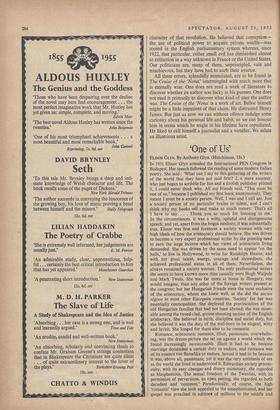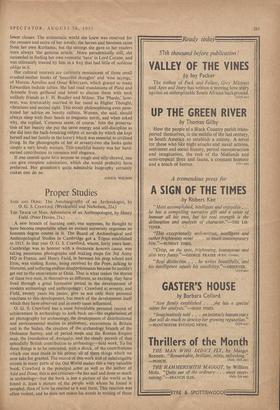`One of Us'
ELINOR GLYN. By Anthony Glyn. (Hutchinson, 18s.) IN 1931 Elinor Glyn attended the International PEN Congress in Budapest. Her speech followed the reading of some modern Italian poetry. She said: 'What can I say to this gathering of the writers of the world that they have not said first? I, a mere amateur, who just began to scribble for fun and a foolish publisher printed it, I could never think why. All my friends said, "This must be one of us," because I published my first book anonymously. They meant I must be a society person. Well, I was and I still am. Just a society person of no particular brains or talent, and I can't think why my books sell and make so much money. That's all I have to say. . . . Thank you so much for listening to me.' In the circumstances, it was a witty, spiteful and disingenuous speech; and yet, apart from the bogus modesty, it was substantially true. Elinor was first and foremost a society woman with very high ideals of how the aristocracy should behave. She was driven to become a very expert professional writer by the pressing need to earn the large income which her views of aristocratic living demanded. She was driven by the same need to appear 'on the halls,' to live in Hollywood, to write for Randolph Hearst; and with her great talent, energy, courage and shrewdness, she achieved professional status in all of them. Nevertheless, she always remained a society woman. The only professional writers she seems to have known more than casually were Hugh Walpole and Mark Twain. She was far more at home in Hungary, one would imagine, than any other of the foreign writers present at the congress; but her Hungarian friends were the most exclusive of the aristocracy, whom she knew well, as she did the ancien regime in most other European countries. 'Society' for her was essentially cosmopolitan. She deplored the provincialism of the old Hungarian families that had not been abroad; she was miser- able among the tweed-clad, grouse-shooting section of the English aristocracy. She believed in birth, discipline and social duty, but she believed it was the duty of the well-born to be elegant, witty and lavish. She longed for them also to be romantic.
Romance, aristocratic romance, illicit, passionate, overwhelm- ing, was the dream-picture she set up against a world which she found increasingly inconvenable. Illicit it had to be because marriage demanded a certain duty to endure, and romance was of its essence too flamelike to endure. Sexual it had to be because it was, above all, passionate; yet it was the very antithesis of sex as the world she lived in understood it. Edwardian society promis- cuity, with its easy changes and dreary monotony, she regarded as blasphemous. The sexual freedom of the Twenties, with its permission of perversions, its open petting, she regarded as both decadent and 'common.' Paradoxically, of course, the high 'romantic' view she took appealed to the unsophisticated, and her gospel was preached in editions of millions to the middle and
lower classes. The aristocratic world she knew was reserved for the censure and satire of her novels; the heroes and heroines came from her own Ruritania; but the settings she gave to her readers were always 'the genuine article.' More paradoxically still, she succeeded in finding her own romantic 'hero' in Lord Curzon, and was ultimately treated by him in a way that had little of noblesse oblige in it. , Her cultural interests are curiously reminiscent of those small crushed-leather books of 'beautiful thoughts' and 'wise sayings,' of Marcus Aurelius and Omar Khayyam, which graced so many Edwardian bedside tables. She had read translations of Plato and Aristotle from girlhood and loved to discuss them with such. unlikely friends as F. H. Bradley and Milner. The 'Phtedo,' how- ever, was irrevocably married in her mind to Higher Thought, vibrations and second sight. This occult philosophising even pene- trated her advice on beauty culture. Women, she said, should always sleep with their heads to magnetic north, and when asked why, she, replied, 'Common sense, of course.' Into the preserva- tion of her beauty she put the same energy and self-discipline as she did into the back-breaking output of novels by which she kept herself and her family in the luxury which was essential to civilised living. In the photographs of her at seventy-two she looks quite simply a very lovely woman. This youthful beauty was her hard- earned contribution to romance and elegance.
If one cannot quite love anyone so tough and silly-shrewd, one can give complete admiration, which she would probably have preferred. Her grandson's quite admirable biography certainly makes one do so.
ANGUS WILSON



































 Previous page
Previous page